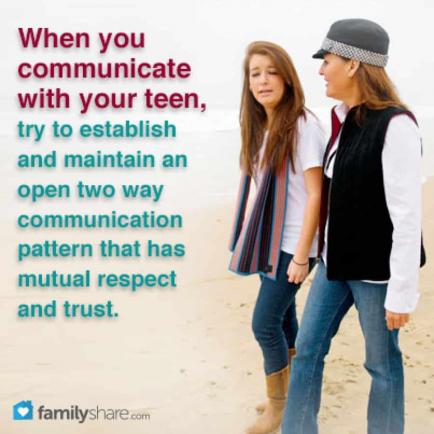
Teenagers want to express themselves and establish themselves as individuals. Ironically, one of the ways that is most important is by their peer group and the approval of that group. Just about everything that a teen does will have their peers in mind. "What will they think?"� Rather than turning your child's choice of friends into a regular battle, there are some things to avoid when discussing your concerns about your teen's friends with him or her.
It is important to establish good communication habits with your teen so that you communication with them on tricky issues can be addressed without hitting landmines. The last thing you want to do is drive your teen to having a secret social life and further rebel. Avoiding the following landmines can help increase your odds that you will be able to communicate with your teen and not drive them further into rebellion and dangerous behaviors.
1. Don't be a Capulet
Establish firm rules about peer group behaviors that are unacceptable at all costs. If these rules are set up beforehand, your teen will know what is expected. The natural consequence of having friends that have broken rules on this list would mean not allowing your teen to associate with these friends. Otherwise, it is unwise to forbid your teen to associate with any particular friend. The very act of forbidding a friendship makes it all the more attractive to a teenager. Case in point? "Romeo and Juliet".
2. Don't give orders
"Subtlety is king" when parenting teenagers. You will become as skilled as a diplomat when offering advice to your teen in a package that makes them think that the ideas that are generated are their own. If you offer guidance and make suggestions, you might be surprised by your teen's wisdom and by their ability to see some of the same concerns that you have about their friends.
3. Don't magnify your teen's friends and minimize your influence
Your influence is part of the foundation of your child's character. You child has the freedom to chose their friends. Friendships formed in the teen years are usually fleeting, and the influence that these friends have does not overpower the influence you have. Show your teen that you trust their decisions, and they will elevate their behavior to keep this trust in your relationship.
4. Don't lecture
The fastest way to cause a communication challenge is to lecture or be lectured. You've probably been with someone who does not listen and only lectures or dictates. Adults do not like being with a bossy know-it-all, and teenagers are no different. When you communicate with your teen, try to establish and maintain an open two way communication pattern that has mutual respect and trust. This type of communication pattern will allow you to have meaningful communication with your teen for years to come.
5. Don't try to be your teen's friend to replace one that you don't like
Your teen wants to have a life outside of the home, and you have a valuable role in your teen's life - as their parent.

